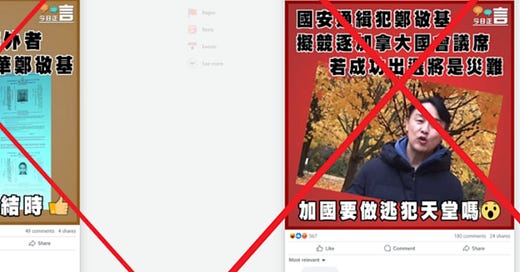TORONTO, Canada — Joseph Tay, the Conservative candidate identified by federal authorities as the target of aggressive Chinese election interference operations, paused in-person campaigning yesterday following advice from federal police, The Bureau has learned.
Two sources with awareness of the matter said the move came after the SITE Task Force—Canada’s election-threat monitor—confirmed that Tay is the subject of a highly coordinated transnational repression operation tied to the People’s Republic of China. The campaign seeks not only to discredit Tay, but to suppress the ability of Chinese Canadian voters to access his campaign messages online, via cyber operations conducted by Beijing’s internet authorities.
Now, with six days until Canada’s pivotal vote—in an election likely to be decided across key Toronto battleground ridings—it appears that Tay’s ability to reach voters in person has also been downgraded.
Tay, a journalist and pro-democracy advocate born in Hong Kong, is running for the Conservative Party in the Don Valley North riding. Federal intelligence sources have confirmed that his political activities have made him a top target for Beijing-linked online attacks and digital suppression efforts in the lead-up to next week's federal election.
Tay’s need to suspend door-knocking yesterday in Don Valley North echoes concerns raised in a neighbouring riding during the 2021 federal campaign—where The Bureau previously uncovered allegations of Chinese government intimidation and targeting of voters and a Conservative incumbent. According to senior Conservative sources, Chinese agents attempted to intimidate voters and monitor the door-to-door campaign of then-incumbent MP Bob Saroya in Markham–Unionville.
Paul Chiang, a former police officer who unseated Saroya in 2021, stepped down as a candidate earlier this month after the RCMP confirmed it was reviewing remarks he made to Chinese-language media in January. During that event, Chiang reportedly said the election of Tay—a Canadian citizen wanted under Hong Kong’s National Security Law—to Parliament would cause “great controversy” for Canada. He then suggested, in a remark reported by a Chinese-language newspaper, that Tay could be turned over to the Toronto Chinese Consulate to claim the $180,000 bounty on his head. Chiang apologized after the comments were reported, claiming his remarks had been made in jest.
In a briefing yesterday, SITE disclosed that Tay has been the victim of similarly threatening online messaging.
One Facebook post circulated widely in Chinese-language forums declared: “Wanted for national security reasons, Joe Tay looks to run for a seat in the Canadian Parliament; a successful bid would be a disaster. Is Canada about to become a fugitive’s paradise?”
Tay, a former Hong Kong broadcaster whose independent reporting from Canada has drawn retaliation from Beijing, rejected Chiang’s apology in March, calling the remarks “the tradecraft of the Chinese Communist Party.” He added: “They are not just aimed at me; they are intended to send a chilling signal to the entire community to force compliance with Beijing’s political goals.” His concerns were echoed by NGOs and human rights organizations, which condemned Chiang’s comments as an endorsement of transnational repression.
In light of the RCMP’s reported advice to Tay this week, the challenges faced by Conservative candidates attempting to meet Chinese Canadian voters in Greater Toronto appear to reflect a broader and troubling pattern.
According to multiple senior figures from Erin O’Toole’s 2021 Conservative campaign—who spoke on condition of anonymity—O’Toole’s team was briefed by Canadian intelligence officials that Chinese government actors were surveilling then-incumbent MP Bob Saroya during the campaign. One source recalled, “There were Chinese officials following Bob Saroya around,” adding that “CSIS literally said repeatedly that this was ‘coordinated and alarming.’”
When asked to comment, O’Toole—who stepped down as leader following the Conservative’s 2021 loss—acknowledged awareness of voter intimidation reports but declined to confirm whether CSIS had briefed his team directly on the matter.
“Our candidate Bob Saroya was a hardworking MP who won against the Liberal wave in 2015,” O’Toole wrote in a statement. “He won in 2019 as well, but thousands of votes from the Chinese Canadian community stayed home in 2021. We heard reports of intimidation of voters. We also know the Consul General from China took particular interest in the riding and made strange comments to Mr. Saroya ahead of the election. It was always in the top three of the eight or nine ridings that I believe were flipped due to foreign interference.”
SITE’s new findings on Tay’s campaign in Don Valley North reinforce those long-standing concerns. “This is not about a single post going viral,” SITE warned. “It is a series of deliberate and persistent activity across multiple platforms—a coordinated attempt to distort visibility, suppress legitimate discourse, and shape the information environment for Chinese-speaking voters in Canada.”
The Task Force said the most recent wave of coordinated online activity occurred in late March, when a Facebook post appeared denigrating Tay’s candidacy. “Posts like this one appeared en masse on March 24 and 25 and appear to be timed for the Conservative Party’s announcement that Tay would run in Don Valley North,” SITE stated in briefing materials.






Will Elections Canada now still sit on its hands? There may be no precedent but at what point will Elections Canada realize that the Markham election house is on fire? Bring out the fire extinguishers! Call the firetrucks. In a court of law, this would be the equivalent of threatening a witness. A mistrial would be declared. Where is the concern for a jeopardized election from any party?
If there is one, how many more are not being reported?